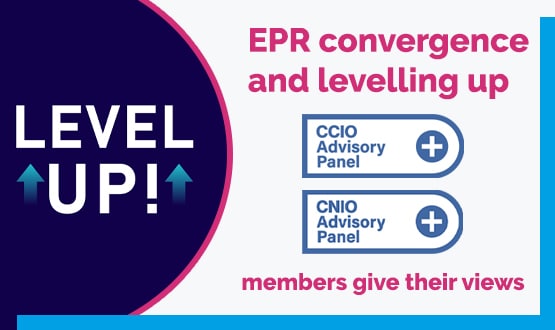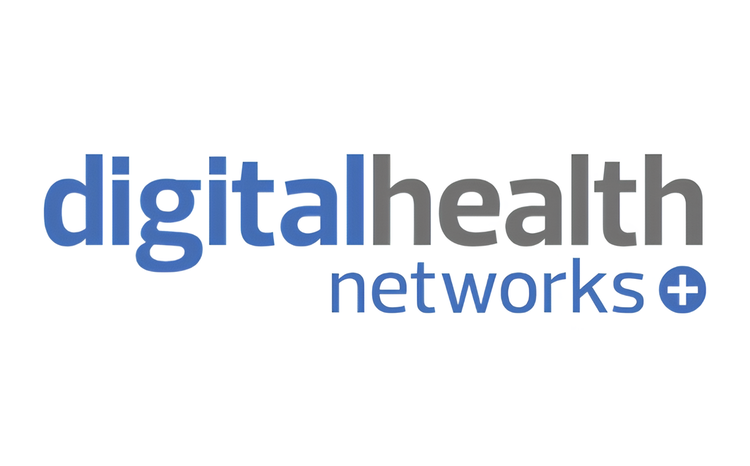EPR convergence and levelling up: CCIO and CNIOs have their say
- 8 July 2022

Our CNIO and CCIO Network Advisory Panel members have followed in the footsteps of the CIOs in giving their thoughts on the electronic patient records (EPR) targets and new policy direction announced earlier this year to level up and converge.
Back in February, the government said it wanted 90% of NHS trusts to have an EPR in place by December 2023, with the remaining 10% in the process of implementing them.
Then in the following month, NHS leaders were reportedly told that they must draw up plans to level up and converge the electronic patient records (EPRs) in use across Integrated Care System (ICS) boundaries.
This target to level up EPR provision across the NHS is in line with the Long Term Plan commitment for providers to achieve a core level of digitisation by March 2025 and demonstrates a clear change in direction on nationally directed digital transformation.
Is this fresh approach the way to go?
Much like our CIO panel members, our CNIOs and CCIOs are unanimously in support of the broad idea to level up and converge the EPRs in use, but question how exactly this will be achieved.
Dione Rogers, CNIO at Barking, Havering & Redbridge University Hospitals NHS Trust, is a fan of the plans and says that “something radical has to happen” due to the number of trusts that still work on paper and have lots of applications that do not talk to each other.
“I am in support of digital convergence and levelling up. I do worry about some of these smaller trusts and how the support will be given to them to do that and it does feel like in order to achieve that, there needs to be a lot of support from more advanced organisations,” she told Digital Health News.
The digital and data lead at the Chartered Society of Physiotherapy, Euan McComiskie, also “utterly agrees” with the broad concept, in particular the improved presence of better quality EPRs across the whole of healthcare.
However, he believes that this new policy direction is not suitable for every trust across the country, describing the situation as “horses for courses”.
He said: “For some trusts a single, monolithic EPR is the way to go. But in other trusts that are delivering care differently to different populations or they’re supporting different professionals offering different services, then that might not be the answer.
“So, it would be unfair to make everybody follow the same pattern if it doesn’t follow the way that their care is delivered.”
The varying levels of digital maturity across the NHS is why the CNIO at The Royal Marsden NHS Foundation Trust, Hayley Grafton, thinks the new policy direction is “very welcome”, but how it plays out is a concern.
“There’s far too much variation at the moment across the NHS and some places are steaming ahead and are probably multiple years ahead of other places, which feels unfair and kind of adds to that postcode lottery,” she said.
“What’s worrying is the lack of clarity around how it’s going to happen. I think in theory we’re absolutely where we need to be, but the reality of it and how it plays out needs to be carefully considered.”
Ronke Adejolu, associate chief nursing information officer at the Transformation Directorate for NHS England and NHS Improvement, echoes some of these views.
On whether this approach is the right one, Adejolu said that “it depends on what they mean by levelling up” but that “if we’re concentrating our efforts on moving organisations or trusts who are still using paper onto a clinical information system then yes of course”.
It is evident that the idea and concept behind the approach is celebrated by the members, but the way in which the policy is achieved and the current lack of clarity around that is a serious worry.
Are the EPR targets achievable or too ambitious?
Whether or not the EPR targets that Sajid Javid announced are achievable in the timeframe set out has sparked plenty of debate. The views of the CNIO panel and CCIO member are generally pessimistic and are less split down the middle in comparison to the CIOs.
Only Rogers from Barking, Havering & Redbridge University Hospitals believes that it is achievable, with fellow CNIO member McComiskie calling it “very aspirational” and “very difficult” to do it in the timescale mentioned. He also fears that the target itself could be a distraction from actually completing the target to a good standard.
He said: “If we set arbitrary targets of X percentage in month X of year Y, then there is a danger that we become so focussed on just the presence of an EPR rather than the presence of a good quality EPR.”
The Royal Marsden’s Grafton also made it clear that “in that timeframe, it’s not realistic” and “to do it right, you need to have that time commitment and organisational change, which all absolutely takes time”.
Adejolu thought that the targets are “ambitious, but not too ambitious”, but questioned whether we had the right leadership to do it. She also explained her disliking of the word ‘targets’.
“Targets don’t work because they’re very rarely met and it’s very premature. I don’t like the word ‘targets’. It’s not about how quickly we can put something in, it’s looking at how well we can do it,” she said.
There are overwhelming doubts from these members about the EPR targets being met in the timeframe and some feel strongly about not setting a target at all.
The big debate about whether they are realistic or overambitious is one reason why they feel targets could be more of a distraction and hindrance than a help in achieving the new policy to a high standard.
A game-changer in the world of healthcare?
If the CNIO members and CCIO were pessimistic about the EPR targets, it is the complete opposite story when it comes to the potential impacts on healthcare if the targets are achieved to a high standard.
McComiskie thinks it would be “massive” and would “allow us to achieve the things that we’ve wanted to achieve for a long time”.
“If we were able to have better quality systems with access for all healthcare and social care professionals, then that would be a massive string to the bow to allow us to deliver the best or the optimal care that we can deliver,” he said.
Grafton’s views on the capabilities if these targets are met are equally as positive. She firmly believes that “we truly have the possibility to change how we deliver healthcare and the kind of outcomes and how effective treatments are”.
This idea of changing how healthcare is delivered was shared by Rogers and reinforced the importance of meeting the targets in the timeframe set out to a high standard.
She said: “If the targets are met by then, I think it allows us to then start proceeding to modern healthcare. With a level playing field, we’ve got a real opportunity to modernise the way that we deliver healthcare.”
The most cautious view belonged to Adejolu, who stressed that “whatever we do now should be something that we can look back on in 20 or 30 years and say we made a huge difference and benefitted patients and clinicians by reducing the backlog and so on”.
“The work we do must lead to a patient’s experience being far better and richer than it was previously,” she added.
There is no doubt that excitement is brewing within the CIO and CNIO Advisory Panels about the general idea of levelling up and converging EPRs within ICSs and the impact it could have, but there still remains one too many unanswered questions on how exactly it will all play out and whether the targets turn out to be a driving force or a big mistake.





1 Comments
Tens of millions of local and central funding have been invested in recent years in implementing Digital Pathology, PACS and LIMS systems across geographical networks of Trusts. Let’s hope someone has enough common sense to ensure these “levelled up” EPRs across ICS boundaries are compatible with these essential systems to avoid anyone having to rip and replace them with a product from the ICS EPR supplier before any real benefits have been realised.
Comments are closed.